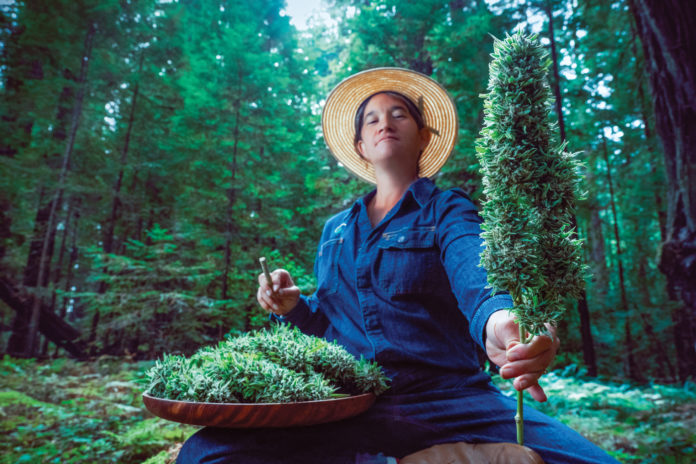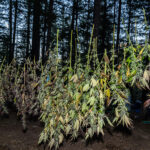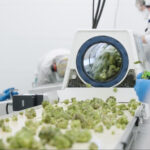With California’s permanent cannabis regulations recently finalized, licensees have a stable foundation of compliance upon which to build their branding and marketing, which is precisely where a lot of energy is being focused as 2019 gets underway. No region feels the pressure to brand more than northern California, and perhaps no county has more branding expectations placed on its shoulders than Humboldt, where cannabis courses through the body politic.
Sunshine Johnston is one farmer who has spent years preparing for just this moment. The owner-operator of Sunboldt Grown Farms dry-farms 10,000 square feet along the Eel River. Arriving in southern Humboldt at the age of seven, Johnston said she was raised by activists and artists in the community where she started farming with her mother. “We grew to save redwood trees and to help indigenous people,” she said.
Johnston still touches the plant every day and said it defines her. “It’s my existence, my identity, who I am, and what I’ve been doing,” she said. “I think it may be because my mom looked at it in a very spiritual way, all those hours listening to Bob Marley as a kid, all the activism.” She paused. “It gave me a sense of freedom and independence I am very grateful for.”
Johnston lives with her husband, Eric, in Redcrest, where she is an avid farmer laser-focused on building a successful brand and a perennially active member of a community with which she closely identifies. A former board member of California Cannabis Voice Humboldt, she regularly attends meetings of the county board of supervisors to speak on behalf of craft cultivators, is a frequent speaker at industry trade events, and hosts a weekly cannabis show on KMUD. “My mom was one of the founders,” she remarked of SoHum’s storied community station.
She’s made time to do all of this as a one-woman band, singlehandedly building a business and brand from scratch, which has meant reinventing herself while simultaneously remaining true to herself and the community that raised her.
“My mom’s generation felt let down by society primarily because their leaders at the time were assassinated; students were killed at Kent State,” she said. “They got kind of upset and just wanted to live outside society. At the same time, they did something unique by starting their own institutions—community centers, a credit union, community schools where parents would help teach the children. There also was a health center started as a result of herbicide spraying by the lumber industry making people sick. There was self-reliance and a do-it-yourself attitude.”
They are qualities Johnston carries forward. “A lot of my motivation is just taking ownership. I feel an obligation to make it; to be successful. I have a responsibility to represent my community.”
A taste for flavor
Johnston has a cool expectation of fame, which might come off as arrogance if she didn’t really know her shit—and not just as a Humboldt-bred cultivator. She also brings years of experience as a local wine broker to the table, invaluable knowledge that gives her a decided advantage in the marketplace.
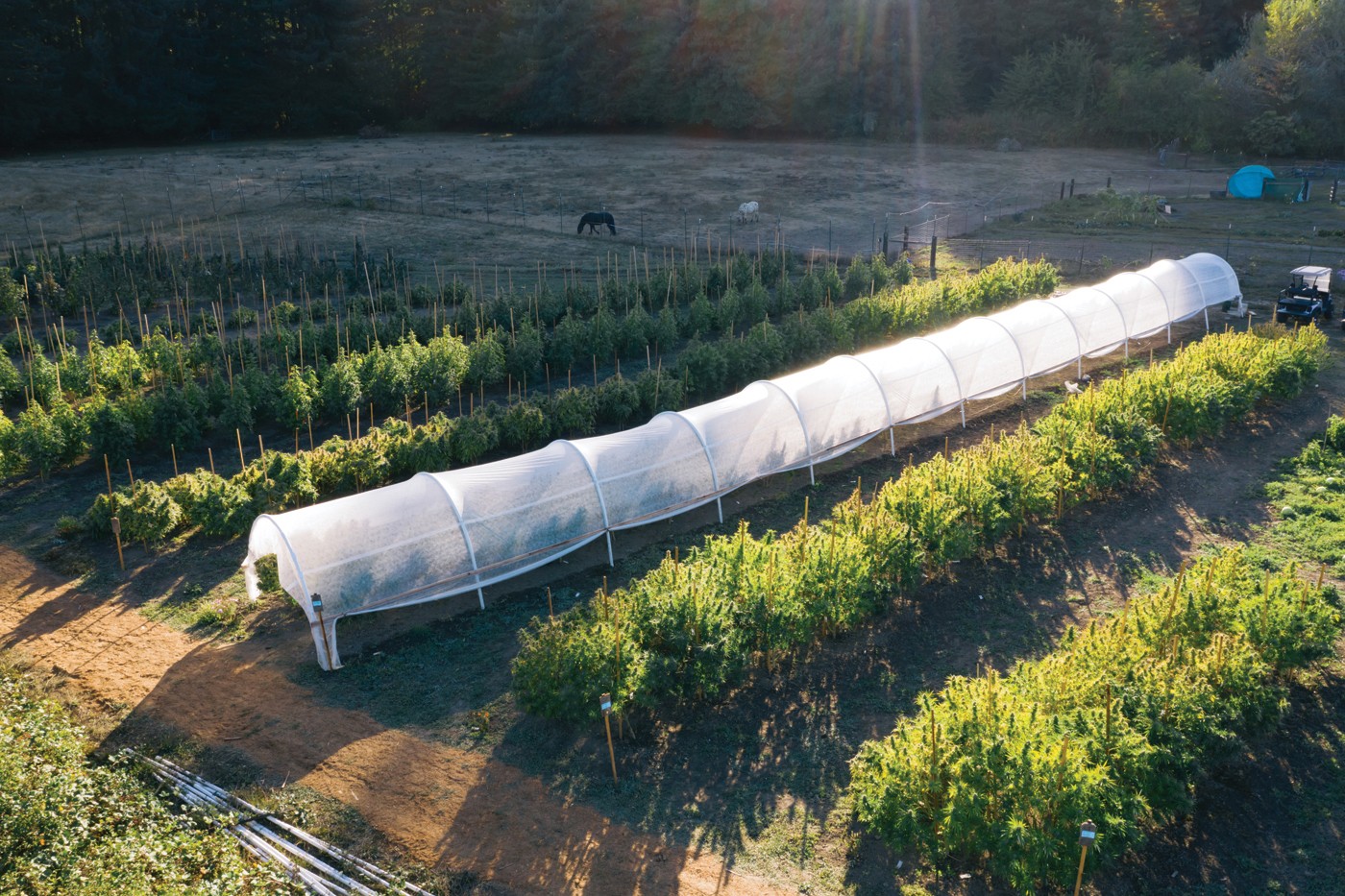
“What has been a major strength for me has been the ten years I spent brokering wine,” she said. “I’ve brokered for lots of small wineries. They have the same issues with distributors and getting paid as cannabis cultivators do. They also have problems getting on the [store] shelf and getting their stories told.”
But her wine experience also gave her something potentially priceless in the cannabis world. “Through that process of selling wine I developed a palate, particularly of flavors,” she explained. The skill came in handy when she started breeding strains a few years ago.
“In 2015, I knew I needed a portfolio of genetics, so I just jumped right into it,” she said. “I started doing crosses and had my own breeding program.” She didn’t take breeding very seriously at first. “I just wanted to make nice flavors and build a portfolio, but other breeders started taking me seriously, I think because I have a palate and I’m able to create flavors,” she explained.
Now she sees her “vintner’s palate” and the benefit it gives her as a cannabis breeder to be a marketable asset. In 2018, she farmed three of her own original strains: Loopy Fruit, Wanderlust, and Chronic Freedom. “This year it really struck me that I have a strength here that I need to make a part of my company,” she said. “That’s great, because I really do enjoy it.”
“My first thought when I see an indoor operation is, ‘Those plants are in prison.” — Sunshine Johnston, owner, Sunboldt Grown Farms
A do-nothing farmer
“I was previously known for having good herb,” Johnston said of life before she founded Sunboldt Grown Farms. Little has been the same since. “I started the company in 2015, and it has been nothing but [research and development] for me ever since,” she said. “It’s not easy to do, but I’ve created a brand with no product. I’ve created demand with no product. If there was anyone who could do it, it was me. All my moves were for one thing and one thing only, and I take it very seriously, and that is going to market. The reason I wasn’t making money in 2016 or 2017 is because I was preparing to go to market in 2019. That’s what I was doing and what all my moves were about. It just takes time.
“There is more to it than flower,” she continued. “Genetics was a big part of it.” She also made a “smart move” in 2017 when she partnered with Nasha to provide flower grown to maturity specifically for hashish. “I had done a little bit of work with Barron Lutz from Nasha, who does bubble hash, and I approached him and asked him to take half my crop,” she said. “No one had ever approached him like this. He looked at me and his first response was, ‘I can’t do that.’ ‘Why not?’ I asked him. ‘I don’t know what to pay you.’ ‘Don’t worry about it,’ I said. ‘We’ll figure it out later.’”
Johnston’s explanation for why she gave Lutz the benefit of the doubt speaks volumes about her business acumen and her people smarts. “The reason I said that was because I watched him pound the pavement and get his product into all these shops the year before, and I knew he had good retail relationships,” she said. “His sales rep down here, who was also his brother-in-law, was going to shops once a week, and I knew that if you’re going to a shop once a week, you’re more likely to get sales and get paid. I knew that was a successful model, and I knew that in 2019 I would need retail partners. He would co-brand me and get me into all these shops. I didn’t have a license, a permit, or anything, and I went for it.”
In the end, the idea worked. “It’s proving itself because bubble hash, unlike distillates or these other types of extracts, shows off the farmer the best,” she said. “You can’t really cut corners like you can with these other things, because you need oil, and to get oil you need to get ripe. The one thing I could say to Barron very convincingly was, ‘I can let things hang. I let things get ripe.’ We didn’t know the oil yields of my genetics, and that was a risk right there for the both of us, but it worked out.”
For his part, Lutz holds the quality of flower he gets from Johnston in very high esteem and is not shy about saying so. At The Emerald Cup in December, when asked what he needed to scale up his own production, he replied, “Twenty more Sunshine Johnston farms.”
Johnston is no less appreciative of Nasha’s product. “I really value the hash because it’s whole-plant medicine, and I feel it shows what I do the best,” she said.
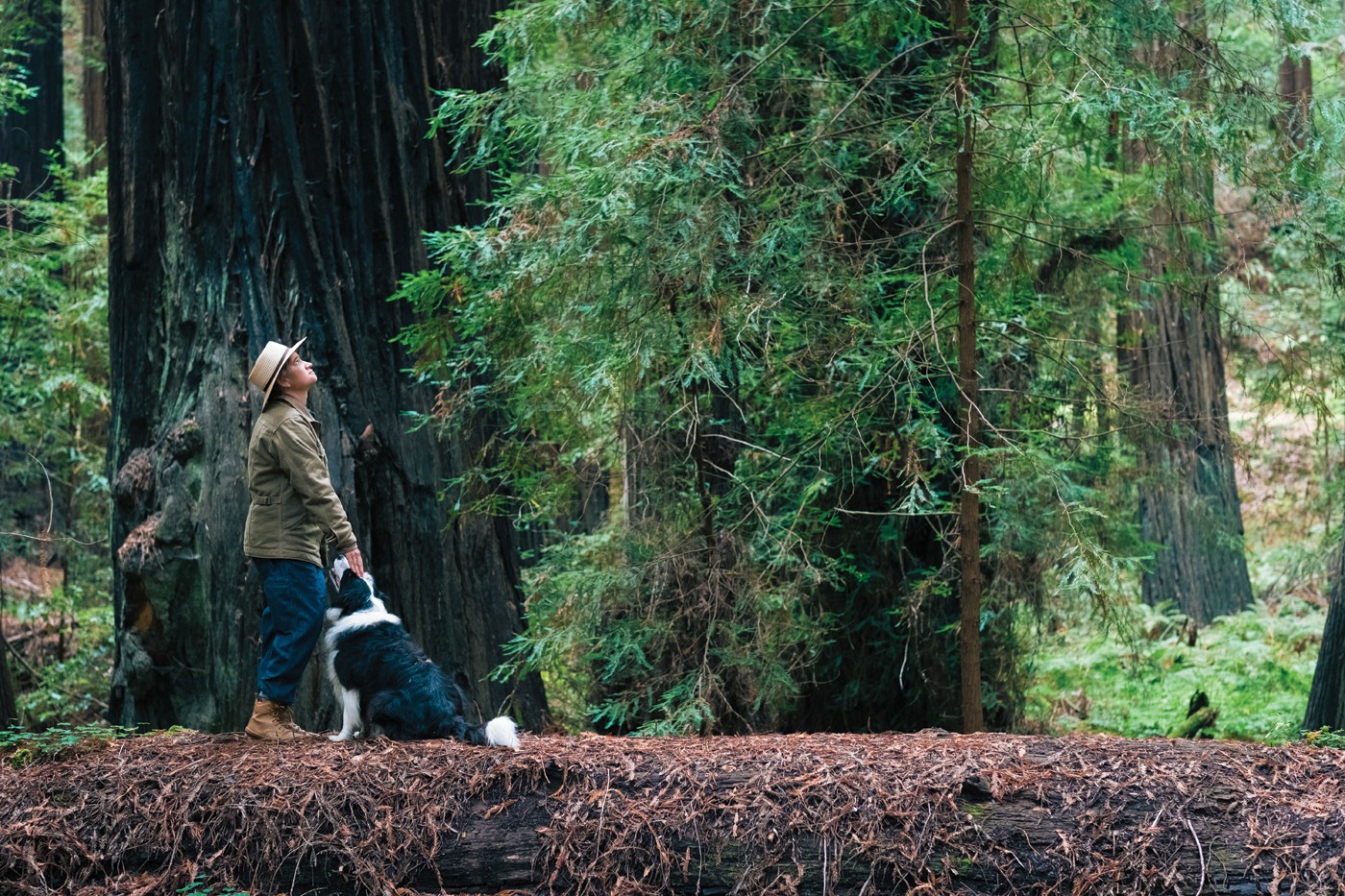
So, what exactly does Johnston do on her dry farm that produces such quality flower? Not much, she said. “I would describe myself as a do-nothing farmer, which stems from The One Straw Revolution: An Introduction to Natural Farming,” she said. Written by Masanobu Fukuoka in 2009, the book describes the author’s “do-nothing” technique, which was described by the New York Review of Books as “commonsense, sustainable practices that all but eliminate the use of pesticides, fertilizer, tillage, and perhaps most significantly, wasteful effort.”
Johnston continued, “It wasn’t until after I had started dry-farming and not using fertilizer that I realized that was what I was doing. A do-nothing farmer is like the concept of ‘do no harm’ by letting nature do the work.”
Half her crop was dry-farmed in 2018, and she was “just stunned at the results.” The plants that were watered were very uneven, but the plants without water flourished.” Now she’s hooked. “All of us who dry farm are very enthusiastic [about it] and want everyone else to dry farm, too,” she said.
To market
“All I’ve been doing is strategizing, and now I’m closing a chapter and starting a new one,” said Johnston. “Once I go to market, everything changes, because now I have a product line.”
She is working hard on her brand strategy now, figuring out her initial product line and gathering funds for packaging. As a craft cultivator, she knows her route to the top will be a singular one defined by more than a cult of personality. “Oh yeah, the easiest thing to do is to market Sunshine Johnston,” she said. “But more important is the message I’m bringing. The more focused I make that message, the stronger I’ll be.
“I define craft farming as the cannabis being the artist,” she added. “It creates me. I am crafted by cannabis. I don’t craft cannabis. I get to be the artist with my branding.”
Johnston has a lot of messages to share, depending on the situation and the target audience, which could range from retailers and distributors to regulators and consumers. Shrewd as a fox, she holds each actor in the cannabis food chain to high standards but demands even more of herself. “My message to corporate America is, ‘Look at this girl. She’s independent. We’re scrambling with all this money, and she’s dry-farming and not using any money?’ I’m a lean operation, and the point is for corporate America to go, ‘I love Humboldt County and this gal is going to make it and that’s good, because we love what comes out of this region.’ I’m the way you want to get your message out there.”
It’s part and parcel of the role she sees for herself. “I feel some urgency to prove myself in the marketplace, because that will give me leadership,” she said. “It will help me because until I do, I will be questioned in this industry. One of the best things I can do is lead by example.”
On that score, Johnston is like an Eveready battery: always moving, never out of juice. She has a million tasks in front of her, but there can be few people in the industry more focused than Sunshine Johnston, whose time as a wine broker taught her a few lessons she still uses.
“There is the naked wine drinker, who wants wine that is less-manipulated by the winemaker, and here is the winemaker who tinkers and manipulates,” she explained. “Only every time you tinker and manipulate, in my mind you lose a little something.
“It’s the same thing with cannabis,” she added. “You have indoor and outdoor. The indoor grower will say, ‘I have so much control over the environment. I can control everything. Control, control, control.’
“My first thought when I see an indoor operation is, ‘Those plants are in prison,’” she continued. “That’s because of the artificial lights, which don’t have a connection with the cosmos. Light from the sun travels eight minutes across the sky and comes in wavelengths that are connected to the cosmos. Indoor lights can have a connection with the cosmos, but they are not the same as the sun.”
“I define craft farming as the cannabis being the artist. It creates me. I am crafted by cannabis. I don’t craft cannabis. I get to be the artist with my branding.” — Sunshine Johnston, owner, Sunboldt Grown Farms
The differences are equally extreme with cultivators. “The indoor grower says it’s the hand of man that manipulates, controls, and brings out the best of the plant’s genetics, that the best genetic expression is brought about by his tinkering,” she said. “It’s his control and what he can do to manipulate the environment in the grow room.
“Then there is me, who says, ‘I’m going to take me out of this as much as possible, because it’s nature and the cosmos that perfects this.
“And the perfection is circumstantial,” she added emphatically. “I don’t create it. It’s not something that happens year after year. It’s like a vintage wine. It’s connected to these earth rhythms, to things I don’t control. That’s what makes it perfect, the things I do not control.”
See more Sunboldt Grown images by Phil Emerson:







